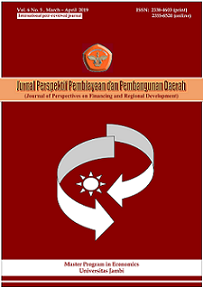Modeling the effects of health care expenditure and economic growth in Nigeria: An econometric analysis
DOI:
https://doi.org/10.22437/ppd.v6i5.6244Abstract
Literature abounds that labor quality, in the form of human capital, clearly contributes significantly to productivity growth, but very few analysts have been interested to locate potential human capital growth outside education. Such interest will help ascertain the effectiveness of public health expenditure on health and the impact of good health to economic growth in Nigeria. This research empirically attempts to analyze health outcome and economic growth; proxied by life expectancy at birth and gross domestic product per-capita respectively using quantitative analysis. To avoid the possibility of encountering simultaneity error, we use the three stage -least -square (3SLS) regression to estimate the result. The result shows simultaneity between health outcome and economic growth. The results equally show that health expenditure is significant in determining health outcome but has no significant relationship with economic growth. As a recommendation government must increase budgetary allocation to the health sector and effectively monitor its utilization.
Downloads
References
Andinet, W. & Shiferaw, G., (2018), An Empirical Analysis of Health Shocks and Informal Risk Sharing Networks, African Development Review, 30(1), 100-111.
Anyanwu, J.C & Erhijakpor, A.E., (2009). Health expenditure and health outcome in Africa, African Development Review. https://doi.org/10.1111/j.1467-8268.2009.002215.x
Bakare A.S & Sanmi, O. (2011). Health care expenditure and economic growth in
Nigeria: an empirical study. Journal of emerging trends in economics and management sciences, 2(2), 83-87
Barro, R. (1996). Health and economic growth, Mimeo.Cambridge, MA: Harvard University.
Bedir, S., (2016), Healthcare Expenditure and Economic Growth in Developing Countries. Advances in Economics and Business, 4(2), 76-86, http://www.hrpub.org DOI: 10.13189/aeb.2016.040202
Bloom, D.E., D. Canning & J Sevilla (2003). The Effect of Health on Economic Growth: A production function approach. World Development, 32(1), 1-13.
Bokhari, F.A.S., Gai, Y. & Gottret, P. (2007). Government health expenditures and health outcomes, Health Economics, 16(3), 257-273.
Boussalem, F., Boussalem, Z. & Abdelaziz, T. (2014). The relationship between public spending on health and economic growth in Algeria. Testing for Co-integration and Causality. International journal of business and management, II(3), 25-39
Bloom D., Canning, D., & Sevilla, J., (2004) The Effect Of Health On Economic Growth: A Production Function Approach. World Development, 32(1), 1-13. www.elsevier.com/locate/worlddev retrieved 20/6/2017
Bloom, D., & Canning, D. (2000). The health and wealth of nations, Science, 287(5456), 1207-1209.
Bloom, D., & Canning, D. (2003). The health and poverty of nations: from theory to practice. Journal of Human Development, 4(1), 47-71.
Carrion-I-Silvestre J.L (2005). Health care expenditure and GDP: are they broken stationary?, Journal of Health Economics, 24(5), 839-854
Eneji, M.A., Vonke, D.J., & Bisong . J.O (2013) health care expenditure, health status and national productivity in Nigeria, Journal of economics and International Finance 5(7), 258-272
Eric, A. & Hassan E.O (2017), The Effects of Health Expenditure on Health Outcomes in Subâ€Saharan Africa (SSA), African Development Review, 29(3), 524-536
Hamoudi, A., & Sachs, J. (1999). Economic consequences of health status: a review of the evidence. Working Paper No. 30. Harvard Center for International Development, Cambridge, MA.
Huang H. Li, L. (2009). Health, education and economic growth in China: empirical findings and implications, China Economic Review, 20(3), 374-387.
Ichoku, H. E. & Fonta, W. M. (2006). The distributional impact of health care financing in Nigeria: A case study of Enugu State. PMMA Working Paper, 17, 3-22.
Jacob, N., Yaw B.A., & Gbetoton, N.D., (2018), How Does the Health Sector Benefit from Trade Openness? Evidence from Subâ€Saharan Africa, African Development Review, 30(2), 135-148
Kim, T.K., & Shannon R.L (2013). Government Health Expenditure and Public Health Outcomes: A Comparative Study Among 17 Countries and Implications for US Health Care Reform. American International Journal of Contemporary Research , 3(9), 8-13
Lucas, R.E. (1988), On the mechanics of economic development. Journal of Monetary Economics, 22(1), 3-42.
Mankiw, N.G., Romer, D., & Weil, D.N. (1992), A contribution to the empirics of economic growth. Quarterly Journal of Economics. 107(2), 407-437.
McCoskey S.K, & T. M. Selden (1998). Health care expenditures and GDP: panel data unit root test results, Journal of Health Economics, 17(3), 369-376
Mehrara M., & M. Musai. (2011), Granger causality between economic growth in oil exporting countries, Interdisciplinary Journal of Research in Business, 1(8), 103-108
Narayan P.K. (2006). Examining structural breaks and growth rates in international health expenditures, Journal of Health Economics, 25(5), 877-890
Nwanosike. U. Orji A, Okafor OJ.C & Umeswbi .S. (2015). “propressive health spending and health outcomes in Nigeria: the case of malariaâ€. International Journal of academic research in business and social sciences, 5(12), 1-12.
Olufunmilayo S.T., Ibrahim A.T., & Risikat O.D (2018), Quantifying Impacts of Macroeconomic and Nonâ€economic Factors on Public Health Expenditure: A Structural Time Series Model, African Development Review, 30(2), 200-218.
Onisanwa, I.D (2014). The impact of health on economic growth in Nigeria, Journal of economic and sustainable development, 5(19). 159-166
Rajkyman, A.S. & Swaroop, V. (2007). Public spending and outcomes: Does governance matter? Journal of Development Economics, 86(1), 96-111.
Romer, P.M. (1990), Endogenous technological change. Journal of Political Economy, 98(5), 71-102.
Sachs, J., & Warner, A. (1997). Sources of slow growth in African economies. Journal of African Economics, 6(3), 335-376.
Solow, R.M. (1956), A contribution to the theory of economic growth. Quarterly Journal of Economics, 70(1), 65-94.
Swan, Trevor W. (1956) “Economic Growth and Capital Accumulation.†Economic Record, 32(2), 334–361.
Wang K.M.. (2011) Health care expenditure and economic growth: quantile panel-type analysis, Economic Modelling, 28(4), 1536-1549
Downloads
Published
How to Cite
Issue
Section
License
Copyright (c) 2019 Lasbrey Iheanyi Anochiwa, Eze Obila, Michael Enyoghasim

This work is licensed under a Creative Commons Attribution 4.0 International License.

















